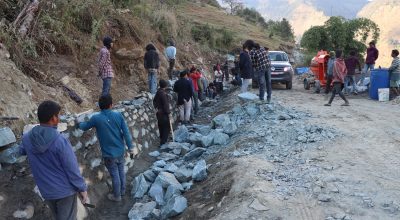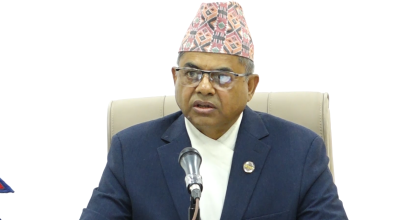
Krishna Acharya
Concerned over possible action, and even blacklisting,
during the upcoming review by the Financial Action Task Force, the
government has introduced a new strategy to combat terrorism financing
and money laundering, which includes a few stringent provisions.
The Financial Action Task Force is an international inter-governmental organisation tasked with combating money laundering. As a member of the task force’s Asia Pacific Group on Money Laundering, Nepal’s progress in combating terrorism financing and money laundering will be up for review in 2020-21.
The government’s new strategy—‘National Strategy and Action Plan for Combating Money Laundering and Financing of Terrorism,’—allows for anyone accused of financial impropriety to be investigated for money laundering.
This means that any complaint registered with government agencies such as the Commission for Investigation of Abuse of Authority, Nepal Police, Department of Revenue Investigation, and the Department of Foreign Employment, will automatically be up for investigation for money laundering.
Furthermore, the strategy will provide authority to the Nepal Police to investigate and file cases related to money laundering and terror finance.
“The skill sets of Nepal Police shall be upgraded in order to qualify the law enforcement agency to coordinate with the Department of Money Laundering Investigation to probe into all cases regarding investment in criminal activities,” the strategy reads.
The Nepal Police’s Central Investigation Bureau (CIB) will be used as a platform to exchange information among all related departments, according to the strategy.
“Cases of severe nature and high risk will be investigated jointly,” it reads.
Currently, the authority to file cases regarding money laundering lies solely with the Department of Money Laundering Investigation. In case the police or other departments want to investigate cases, they would need permission from the department, according to the Money Laundering Prevention Act 2008. The new strategy states that this provision will be amended.
There will also be a mandatory provision for an individual to have only one account. Transactions of above Rs 100,000 will be allowed only through digital accounting, the strategy reads.
Moreover, any state financial transactions will be carried out via bank accounts. There are also provisions to digitalise transactions and information through mobile apps.
The strategy has a plan to design a set of procedures related to money laundering, that will be included in all public sector training manuals. Government officials will also be required to sign a performance contract on eradicating money laundering, which will become a basis for their evaluation.
According to the strategy, the Office of the Auditor General will conduct an audit regarding whether the concerned organisation has made any attempts to combat terror financing and money laundering. The strategy will be monitored by the Prime Minister’s Office and the Cabinet.
As part of the strategy, four different mechanisms comprising of high-level government officials have been formed to work towards preventing money laundering.
As part of the Asia Pacific Group on Money Laundering, officials say Nepal has managed to avoid being blacklisted so far but it faces a high risk due to slow progress and its non-committal approach to combating money laundering.
If a country is blacklisted, all foreign financial institutions will stop conducting transactions with the country. In the modern banking system, import and export would be shut if any bank rejects transactions.
“This strategy seeks to make all sectors equally responsible,” said an official at the Ministry of Finance on condition of anonymity. “It has primarily added to the responsibility of banks and financial institutions, and the investigation body has been further empowered.”
The strategy also a provision of bringing all remittance-related activities under the surveillance of the central bank.
Ther Nepal Rastra Bank, as per the strategy, needs to maintain a list of remittance companies, company agents and branch agents.
“The Department of Foreign Employment should provide remittance orientation training before issuing labour permits to foreign employment seekers,” the strategy reads. The Department of Foreign Employment, Foreign Ministry, the Non-Resident Nepali Association (NRNA) and their country organisations, and the Immigration Department should have their links on the website of Nepal Rastra Bank.
Through the new strategy, the government also wants to make it mandatory for all banks, financial institutions and remittance entrepreneurs that they ensure that their transactions are conducted through software.
It also aims to enforce the use of software for Securities Board of Nepal, the Employees’ Provident Fund, Citizen Investment Trust and the savings and financial cooperatives which have their paid up capital exceeding Rs 100 million.
According to the strategy, that purchase of house, land and valuable metals by non-financial professionals and entrepreneurs should be strictly monitored. Likewise, new technology and non-profit sector have been categorised as high risk areas.
“Special regulatory surveillance would be arranged for businesses such as currency price transfer, currency exchange, real estate and precious metals,” states the strategy.
Likewise, government bodies will be designated for the regulation and supervision of Financial Technology, virtual productions, equipment businesses.
The strategy also states that arrangements would be made for self-monitoring of the concerned bodies.
A business transparency unit would be set up for the investigation of money laundering in businesses.
“Modern methods such as undercover operation, arrest waiver, interception, control delivery, access to computer system, would be adopted for identifying the real owner of the property under investigation,” states the strategy.
It also pledges to build a system for filling up forms where the genuine owner should declare the identity while registering, getting permission, renewing and transferring ownership of the property.
Reports have surfaced that many people have been involved in laundering illegal money by remitting them to Nepal by setting up shell companies in tax havens.
The strategy states that it has adopted the system for declaring the real owner to discourage such illegal practice.
“Special methods would be implemented for identifying the real owner while examining or determining tax and revenue,” the strategy states.
There is also provision for initiating action against the organisations failing to provide or hiding information about suspicious trade, while the customs department should designate a contact point for international coordination.
“A coordination desk for reciprocal legal support would be designated under the aegis of the Foreign Ministry,” the strategy states.
“The role of foreign based agencies would be enhanced for the intelligence collection on financial crimes.”
There is also a provision for signing treaties for mutual legal support, and such treaties will be signed with at least two countries in a year.
“A roadmap will be made for receiving intelligence from foreign countries, information exchange and their use and sign agreement with foreign financial information units,” the strategy states. “Bilateral contacts will be developed by non-profit regulator, tax, customs and other agencies with their foreign counterpart organizations.”
Experts say though Nepal has no option than to come up with a strong strategy or policy and implement it to avoid getting blacklisted, the implementation part still remains a challenge.
“Nepal has no choice but to implement the strategy, given its current situation, in order to avoid being blacklisted,” said Shanta Raj Subedi a former finance secretary. “However, there is confusion among government bodies when it comes implementing the earlier strategy and pursue the investigation, especially after the Department of Money Laundering Investigation was brought under the Prime Minister’s Office.”
Weeks after KP Sharma Oli returned to power in February last year, around a dozen agencies, including the Department of Money Laundering Investigation, were brought under the Prime Minister’s Office, authorising it sweeping powers to deal with issues ranging from security to finance.
“Certain provisions have already been laid out in the act related to money laundering. But the department is under the prime minister now,” Subedi told the Post. “The failure to amend the Act has made it difficult to conduct important tasks relating to the prevention of money laundering. It is doubtful whether the current strategy would be implemented.”
Though Nepal has escaped blacklisting by the Financial Action Task Force, it has failed to come up with workable mechanisms to convince that it is committed to implementing the existing provisions to stop finance terrorism and money laundering.
“It won’t take long for Nepal to get blacklisted if it fails to implement the strategy,” said Subedi. “Such a failure would put our entire economy at peril. We will be in a situation where none of the international financial institutions and bodies would do transactions with us. That’s why the strategy must be implemented at any cost.” (Source: The Kathmandu Post)













